
Purpose The purpose of this study was to empirically analyze the relationship between a commercial sports centers employees’ empathy, job satisfaction, customer orientation, service quality & organization loyalty through structural equation model analysis. Methods For this purpose, this study set 205 employees’ at the eleven commercial sports centers located in Seoul as the research subjects. In an effort to verify the proposed structural model, this study used IBM SPSSWIN Ver. 21.0 and AMOS 18.0. Results First, cognitive empathy had a positive effect on job satisfaction. Second, emotional empathy had a positive effect on job satisfaction. Third, communication empathy had a positive effect on job satisfaction. Fourth, job satisfaction had a positive effect on customer orientation. Fifth, job satisfaction had a positive effect on service quality. Sixth, job satisfaction had a positive effect on organization loyalty. Seventh, customer orientation didn’t had a positive effect on organization loyalty. eighth, service quality had a positive effect on organization loyalty.


Purpose This study attempted to investigate the difference on job satisfaction and service quality between non-regular and regular workers in commercial sports facilities. Methods With the purpose of the study, the purposive sampling as the non-probability sampling method was used to intentionally select the representative cases. We conducted through utilizing in-depth interviews with 6 non-regular and regular workers, respectively, who have worked for more than a year at total commercial sports facilities holding more than 3 programs with more than 500 memberships. This study aimed to explain real phenomena as much as possible by utilizing NVivo 11, one of qualitative research method programs, on the basis of raw data. Results In conclusion, non-regular and regular employment types in commercial sports facilities did not affect service quality provided for customers. However, it was derived that there was a slight difference between regular and non-regular workers on job satisfaction. Conclusion It is necessary to improve the wage and compensation system for regular workers as well as the labor policy to improve treatment of the wage according to the qualification of non-regular workers in commercial sports facilities. In spite of the instability of non-regular workers, the effort of converting into regular workers would evoke organizational commitment, loyalty, and attachment of non-regular workers, when properly acknowledged.






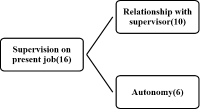
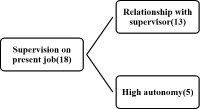









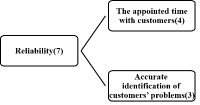





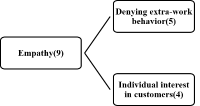

Purpose The purpose of this study is to empirically inquire into the relationship between a indoor swimming pools employee’s group cohesiveness, swimming pool identification & communication and job satisfaction, customer orientation, long-term orientation, and positive word of mouth through structural equation model analysis. Methods For this purpose, For this purpose, the survey targeted 221 workers working at 10 swimming pools in Seoul for over three months. For sampling method, convenience sampling method was used, while the questionnaire was self-administered. In an effort to verify the proposed structural model, this study used IBM SPSSWIN Ver. 21.0 and AMOS 18.0. Results First, group cohesiveness, swimming pool identification & communication has positive influence on the job satisfaction. Second, job satisfaction has positive influence on the customer orientation. Third, job satisfaction has positive influence on the positive long-term orientation. Fourth, customer orientation has positive influence on the positive word of mouth. Fifth, long-term orientation has positive influence on the positive word of mouth.

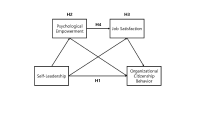
[Purpose] The purpose of this study is to draw practical implications applicable to the field through analysing serial multiple mediator model of self-leadership, psychology empowerment, job satisfaction and organizational citizenship behavior. [Methods] In order to achieve the purpose of this study, we surveyed Korea national league players(187 usable sample). Four hypotheses were tested using frequency analysis, exploratory factor analysis, reliability analysis, correlation analysis and PROCESS macro through SPSS statistics. [Results] The results are as follows. First, self-leadership has a significant effect on organizational citizenship behavior. Second, mediating effects of psychological empowerment between self-leadership and organizational citizenship behavior were significant. Third, mediating effects of job satisfaction between self-leadership and organizational citizenship behavior were significant. Fourth, serial multiple mediator effects leading to self-leadership→psychological empowerment→job satisfaction→organizational citizenship behavior were significant. [Conclusions] Korea national league players must perform self-leader, goal setting, self-observation, self criticism, constructive thinking strategies, dedication and voluntary attitude for clubs and colleagues. The team’s coaches should strive to praise the athletes for their pride, provide appropriate feedback, prevent job burnout, and the management of front office should make practical efforts such as improving the welfare environment and presenting the future vision of club.
